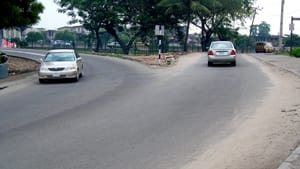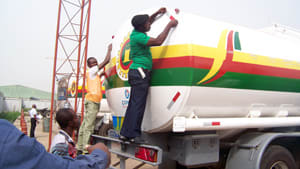
Although they kill more people each year than either malaria or tuberculosis, traffic accidents rarely receive the same kind of attention.
But that may be starting to change. Next year will mark the mid-point review in a Decade of Action on Road Safety declared by the United Nations in 2011 in response to a growing public health crisis that will claim more lives in the developing world than HIV and AIDS by 2030.
Already, the spotlight is intensifying as donors, NGOs and corporations push for progress in the run-up to next year’s review. Recently, The Economist and The Washington Post ran in-depth reports on the need for urgent action to protect citizens in developing countries, who account for a starkly disproportionate 92 percent of the 1.3 million annual road deaths around the globe.
There’s no simple solution, however. Road safety involves so many different elements — infrastructure, engineering, emergency medical services, traffic laws, enforcement, and public education, to name a few — that it’s often unclear who actually “owns” the issue, making it difficult to mobilize funding and political action.
As the international community seeks answers on road safety in the coming year, it’s worth taking a closer look at what has worked and what could serve as a model for future action.
Working across sectors
One of the best examples comes from one of the worst traffic safety environments: Nigeria. In 2006, one of the country’s largest private sector firms, Chevron, became increasingly troubled by the toll of road traffic accidents, a problem that put employees and customers at risk, disrupted business operations and increased costs.

At the same time, the Nigerian government and the World Bank were seeking sustainable solutions to an issue that was claiming thousands of lives per year and costing the equivalent of 1-3 percent in GDP.
Our firm, Washington, D.C.-based AMGlobal Consulting, spoke to a number of road safety stakeholders and ultimately convened two departments of the World Bank, two divisions of the Nigerian government, and a group of domestic and international corporations to form a road safety coalition. This public-private partnership established a joint Road Safety Action Plan, which included support and financing for a model Safe Road Corridor, and conducted significant outreach campaigns to educate road users across Nigerian society.
One of the most impactful elements of the coalition was the creation of local road safety NGO, the Arrive Alive Road Safety Initiative. Funded by the coalition’s private sector members, AARSI has become a dominant force for road safety in Nigeria. Among other achievements, it has educated thousands of Nigerians on road safety behaviors, corrected numerous traffic “hot spots” prone to accidents, outfitted tens of thousands of trucks with reflective gear, and collaborated with the government in 2006 to enact groundbreaking motorcycle safety legislation.
But creating and maintaining the road safety partnership was not always easy. The team learned a few practical lessons along the way that can help guide other groups around the world hoping to take collective action on road safety:
1. Share responsibility. Each partner should have a clear role in decision-making and implementation. Contributions can include funding, technical expertise, staff time or in-kind donations, but the important thing is that each participant leverages its respective assets and feels invested in the partnership’s success. True shared responsibility minimizes each partner’s risk while maximizing the collective impact on legislation or public awareness.
2. Ensure local leadership. No one knows the issue better than the people who live with it every day. Establishing AARSI gave the road safety partnership a critical source of local expertise, but also helped mobilize support from the government and outside donors. Perhaps most importantly, local ownership of an issue ensures long-term sustainability even as business and government leaders change.
3. Make and keep long-term commitments. Each partner should build the coalition’s goals into its own organization’s long-range planning. The road safety partnership was not only supported by a years-long commitment from Chevron, but was written into a multi-year World Bank project with the Nigerian government, ensuring financial sustainability and political support.

4. Increase visibility. While virtue is its own reward, a little extra publicity never hurts. Particularly for private sector partners, promoting road safety activities was a valuable opportunity to connect with customers and the communities in which they operated. Incorporating public relations activities into the partnership work helps get partners to the table and incentivize them to stay.
5. Imitation is the sincerest form of success. Building partnerships in other countries is easier with a tried-and-true blueprint. Costs and commitments are more predictable, and partners save time and money by not having to research and build a model from scratch. The Nigeria road safety partnership worked to achieve a simple structure with easily replicable partnership elements in the hope that other companies, governments, and donors could achieve similar success in other environments.
Road safety is a particularly complex public health challenge, but that doesn’t mean it’s particularly hopeless. The ability of numerous diverse interest groups to come together in Nigeria, devise a cohesive strategy, and implement sustainable results, shows that true progress on the issue is possible.
As the death toll from traffic accidents steadily rises, stakeholders in countries around the world will be under increasing pressure to devise innovative, workable solutions. Fortunately, we have some helpful “road-tested” models to guide us.
Join Devex, the largest online community for international development, to network with peers, discover talent and forge new partnerships — it’s free. Then sign up for the Devex Impact newsletter to receive cutting-edge news and analysis every month on the intersection of business and development.






